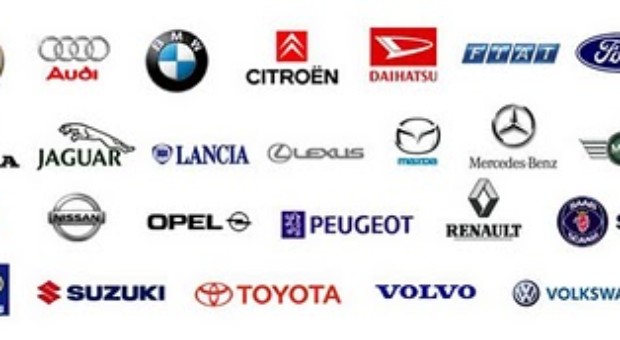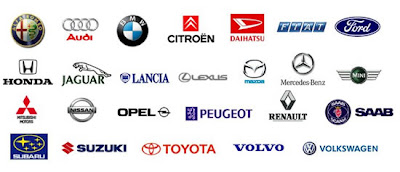
Indeed, we care about and for cars more than we care for ourselves. And often, the first thing we care about is the brand, symbolized by the logo.
Some of these car logos are famous throughout the world, instantly recognizable at a moment’s notice. The Mercedes Benz three-pointed star, the Ferrari prancing horse, the Chevrolet bow-tie – they represent the brand wherever there products are found. Here, we present the not-so-well-known stories behind some of these well-known logos, in no particular order. We have intentionally not included logos that are self-explanatory, such as those that include the name (or initial) of the brand – Ford, Honda, etc.
1. Mercedes Benz: Two German car manufacturers, Benz & Cie. and Daimler Motoren Gesellschaft, merged in 1928 giving rise to Daimler Benz Co. The famous three-starred logo was originally designed by Gottlieb Daimler in 1909, and subsequently featured on Daimler Benz cars. After Daimler’s death, his partner, Wilhelm Maybach, took over the company and sold many Daimler cars to wealthy businessman Emile Jellinek, who later bankrolled development of a new line of cars named after his daughter Mercedes. Hence, the name. The logo is supposed to represent the brand’s “domination of the land, the sea, and the air.”
2. Ferrari: The famous Cavallino Rampante or “prancing horse” logo has its origins in a chance meeting between company founder Enzo Ferrari and Countess Paolina, mother of Count Francesco Baracca who had been an ace of the Italian air force and used to paint a horse on the side of his planes. The Countess asked Ferrari to paint a horse on his cars for luck. The black color was used to symbolize grief at Baracca’s death in action while the yellow color represented his birthplace of Modena.
3. Chevrolet: The Chevrolet bow-tie logo is one of the simplest, yet most well-known corporate symbols in the world. It was first used in 1913 and there are conflicting stories on its origin. While one theory goes that it was inspired by a wallpaper pattern seen by co-founder William Durant, another says that it represents a Swiss cross in a homage to the origins of the other co-founder Louis Chevrolet. Incidentally, Durant had founded General Motors before he was forced out and established Chevrolet.
4. Dodge: The brand has a new logo since this year, but most people still identify it with the “ram’s head” logo. The logo first appeared as a hood ornament in the 1930s. The ram was chosen for its ruggedness, something Dodges have always tried to portray. In fact, so popular did the logo become that Dodge trucks began to be called Rams. Today, it is still used for the spun-off Ram brand.
5. Buick: Not many know that Buick is the oldest American automobile manufacturer. Founded in 1899 by David Dunbar Buick, it was later acquired by William Durant and became the centerpiece of the General Motors conglomerate. The logo was originally a single shield representing Buick’s ancestral coat of arms. In 1960, the single shield was replaced by a trio in red, white and blue representing the three cars then in the Buick stable – the LeSabre, Invicta, and Electra.
6. Maserati: This Italian luxury car manufacturer was established in 1914 by the five Maserati brothers Alfieri, Bindo, Carlo, Ettore, and Ernesto, in the town of Bologna. The trident logo was designed by an artist and is based on a sculpture in the Fontana del Nettuno (Fountain of Neptune) at Bologna. Neptune is the Roman God of the Seas and is represented with a trident in his hand.
7. Mitsubishi: The Mitsubishi brand of cars is member of a larger conglomerate that began life as a shipping firm in 1914 and is named after the Japanese words for three diamonds (“mitsu” meaning “three” and “bishi” meaning “water caltrops,” also rhomboidal like diamonds). Consequently, the origin of the logo becomes clear.
8. Subaru: The name of the company is actually the Japanese translation of the Pleiades star cluster, which also means “to gather together.” Subaru is a division of Japanese transportation conglomerate Fuji Heavy Industries (FHI). The name refers to the five companies that joined forces (Fuji Kogyo, Fuji Jidosha Kogyo, Omiya Fuji Kogyo, Utsunomiya Sharyo and Tokyo Fuji Sangyo) to form FHI. The logo represents the cluster.
9. Mazda: The company derives its name from the Persian God Ahura Mazda as well as the name of the founder Jujiro Matsuda. The stylized “M” logo, also known as the “owl” logo, represents Mazda stretching its wings for the future. It may also represent Ahura Mazda, who is often depicted by a flying sun-disk.
10. Audi: The company’s name is based on the surname of the founder August Horch, meaning listen – which, when translated into Latin, becomes Audi. Horch had originally founded Horch Automobil-Werke, from where he was forced out before founding Audi in 1899. In 1932, Audi merged with Horch, DKW, and Wanderer, to form Auto Union. The Audi logo of four intersecting rings represents this merger. Its resemblance to the Olympic logo caused the International Olympic Committee to sue Audi in 1995.
11. Pontiac: GM may have declared its intent to phase out the Pontiac brand by the end of 2010, but its arrowhead logo continues to be highly visible on American roads. The brand was named after Native American leader Chief Pontiac who led a struggle against British occupation in the 18th century. While the earliest Pontiac logo depicted by a Native American chief’s headdress, it was updated in 1957 to the currently used American Indian red arrowhead design, also known as the “Dart.”
12. BMW: Rounding off this list is drivers’ favorite BMW. The abbreviation stands for Bayerische Motoren Werke AG (Bavarian Motor Works). The two-layered circular BMW logo, also described as a roundel, has been interpreted to represent a spinning propeller, considering the company started as a manufacturer of aircraft engines. The white and blue colors represent the official flag of Bavaria, a state in Germany where BMW originated.
John Kendrick Bangs (1862-1922), American author, editor and satirist.

















